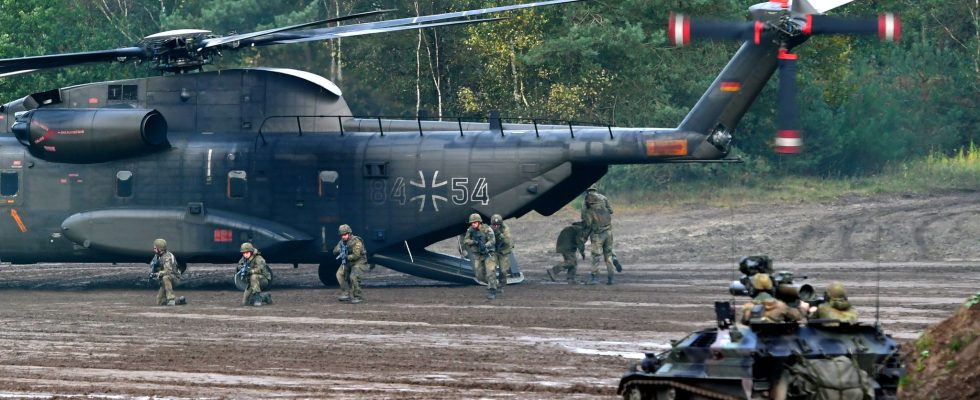Even before presenting this Tuesday, March 14, her annual report on the state of the German armed forces, the parliamentary controller of the Bundeswehr wanted to anticipate the shock by making a few statements to the press. “The army lacks everything”, repeated Eva Högl in the media. “The soldiers fight every day against the shortage”, deplores the one who is nicknamed “the lawyer of the soldiers”.
No one disputes his worrying observation: Germany is currently unable to defend itself against an attack. The new Defense Minister, Boris Pistorius, is all the more worried about this since his predecessor, Christine Lambrecht, had not seen fit to order the equipment delivered to Ukraine to replace them in the barracks. Result: Germany is even more vulnerable than before the war! Ammunition reserves would last two days. The equipment is so old that the tank drivers, who use radios from the 1980s, have to communicate with each other from their turrets. It is a “broke” army, according to the expression of its own generals.
Boris Pistorius is therefore the man who must save this tattered Bundeswehr to turn it into a fighting army. He was the last competent social democrat that Chancellor Scholz managed to find in the Social Democratic Party (SPD) to take this high-risk position, dubbed the “ejection seat” in Berlin political jargon. Armin Papperger, the boss of the industrialist Rheinmetall (manufacturer of the Leopard tank), did not fail to recall that Pistorius was the company’s eleventh interlocutor at the Ministry of Defense since the start of his career!
Russian connection
Nobody expected in Berlin this regional interior minister of Lower Saxony, former mayor of Osnabrück (his hometown), without federal experience, but who is among the most experienced politicians in the country in terms of security. Especially since this Russian-speaker had been part of this fringe of the SPD which had ignored the Putin threat. In particular, he questioned the effectiveness of the sanctions taken by the West against Russia after the occupation of Crimea. “Another member of the ‘russian connection’ who takes his place in the federal cabinet”, had carried away the conservative deputy Tilman Kuban during his nomination. Since then, Pistorius has clearly distanced himself from his previous positions.
“So far, he has done flawlessly,” says Christian Mölling, defense expert at the German Institute for Foreign Policy. Boris Pistorius is even at the top of the popularity polls, far ahead of the Chancellor and the Ecologist Minister of the Economy, Robert Habeck, the former darling of the polls.
“We need planes that fly”
Has Germany found the right minister to implement the “Zeitenwende” (change of era) decreed by Olaf Scholz a year ago? “We need planes that fly, boats that can take to the sea and soldiers equipped for their missions”, declared the Chancellor, three days after the Russian attack, announcing a special fund of 100 billion to modernize the Bundeswehr (German army). Scholz’s goal is to provide Germany with “the largest conventional NATO army in Europe”.
During the Munich Security Conference in mid-February, Boris Pistorius announced a structural reform of his ministry, part of which is still in Bonn, the former capital. “Yes, 3000 people, that’s a lot in the ministry,” he said without giving more details on his reform projects. However, he demonstrated that he was even more determined than the Chancellor to help Ukraine. As Scholz continues to hide behind Washington to make decisions, Boris Pistorius seems ready to take on that leadership role in Europe that Joe Biden expects from Germany.
By asking its European allies to deliver the Leopard battle tanks promised to Ukraine more quickly, Germany no longer gives the impression, with it, of being a brake, but rather the spearhead of aid. Western military in Kiev. If Scholz believes that Ukraine “must not lose” the war, Pistorius prefers the formula “Ukraine must win”. “The choice of words is not insignificant”, believes Christian Mölling.
An F1 without engine
The task of this 63-year-old social democrat, who dreamed in his youth of becoming a diplomat, is immense, as confirmed by the report published on Tuesday in Berlin. To make the Bundeswehr the most powerful army in the European Union, Boris Pistorius will not be able to content himself with the 100 billion euros from the special fund created by Olaf Scholz last June. He claims at least 10 billion more per year to buy tanks, howitzers but also air defense systems, weak point of the German army. “For the moment, the ‘change of era’ of Scholz, it is an F1 which has no engine”, notes Christian Mölling.
A mission all the more difficult as the Liberal Minister of Finance in the government, Christian Lindner, absolutely insists on the return of the sacrosanct “debt brake” inscribed in the Constitution. In his own political camp, which continues to refer to Willy-Brandt’s ‘détente policy’, he already senses headwinds. The co-chair of the Social Democratic Party, Saskia Esken, would prefer that the gigantic sums dedicated to armaments be spent on civil security or school buildings.
For now, Pistorius is still enjoying a grace period. “He has only had nice words so far, but everyone leaves him alone. This is not the time to put a spoke in his wheels”, notes Christian Mölling. “I’ll give him another month,” warns Anton Hofreiter, the specialist in security and defense issues at the parliamentary group of environmentalists. “But afterwards, he will have to make decisions”, he said before adding: “In his ministry, we have not yet realized that a war is raging in the middle of Europe”.
